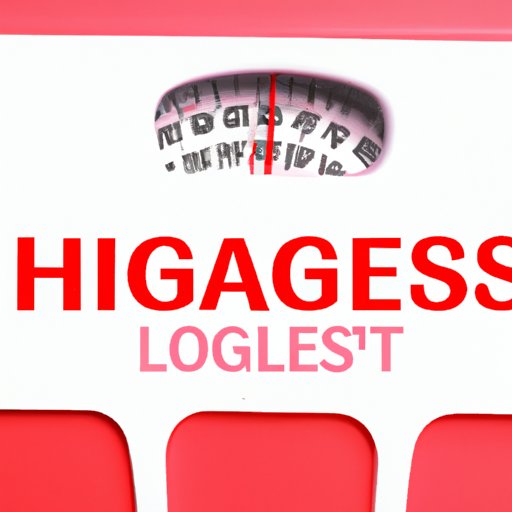
Introduction
A hysterectomy is a surgical procedure that removes a woman’s uterus. It is a common procedure, with over 600,000 performed each year in the United States alone. While a hysterectomy can be a life-changing procedure for women suffering from medical conditions like uterine fibroids, heavy menstrual bleeding, or cancer, it can also raise questions about the body’s changes post-surgery.
In this article, we will explore the relationship between hysterectomy and weight gain. We will also discuss ways to manage weight after surgery and offer tips on healthy lifestyle changes that can help you maintain a healthy weight even after a hysterectomy.
The Effects of Hysterectomy on Weight: Myths and Facts
One of the most common concerns after hysterectomy surgery is weight gain. However, are these concerns justified, or are they just myths?
Myth: All women gain weight after hysterectomy
Fact: While many women do experience weight gain after hysterectomy surgery, not all do. The degree of weight gain, if any, can vary greatly from person to person.
Myth: Weight gain after hysterectomy is due to a slowed metabolism
Fact: While hormonal changes can impact metabolism and fat accumulation, hormonal changes aren’t the only contributing factors to weight gain. Factors like age, diet, and physical activity also play a role in how fast or slow metabolism is.
Myth: Women only gain fat after hysterectomy surgery
Fact: While many women do experience increased fat storage after surgery, other types of weight gain are also possible. Water retention, due to the surgical procedure or hormonal changes, can cause temporary weight gain. Additionally, muscle mass loss can contribute to a decrease in overall weight.
Managing Weight After Hysterectomy – Tips and Tricks
Weight management after hysterectomy surgery is possible with a few simple tips and tricks.
Tip: Exercise
Regular exercise, including strength training and aerobic exercise, can help prevent muscle mass loss and increase metabolism, which can aid in weight loss.
Tip: Diet Changes
Making healthy, balanced diet changes can help prevent additional weight gain after surgery. Focus on incorporating protein-rich foods, whole grains, and fruits and vegetables into your meals. Avoid processed foods, high-sugar foods, and high-fat foods that are high in calories.
Tip: Lifestyle Changes
Changes in your lifestyle, such as increased physical activity and reduced stress levels, can also impact your weight. Try incorporating stress-reducing practices, like meditation or yoga, into your daily routine, and increase physical activity whenever possible.
It’s important to set realistic goals and expectations for yourself when it comes to weight management. Talk to your healthcare provider about your weight management plan, and don’t hesitate to seek out support from friends, family members, or a qualified medical professional if needed.
Hormonal Changes and Weight Gain: Understanding the Link After Hysterectomy
Post-surgery hormonal changes can be a contributing factor to weight gain after a hysterectomy.
During a hysterectomy, the ovaries may be left in place or removed. If the ovaries are removed, a woman may experience early menopause, which can cause a drop in estrogen levels. Estrogen plays a role in regulating weight, so a decrease in estrogen can lead to weight gain.
However, hormonal changes can be managed in a variety of ways. Hormone replacement therapy, or HRT, can help alleviate some of the negative symptoms of menopause, including weight gain. Your healthcare provider can work with you to determine the best course of treatment for your individual needs.
It’s also important to prioritize your emotional health after surgery. Stress can impact hormonal balance, so finding ways to reduce stress can also have a positive impact on your weight management journey.
How to Prevent Weight Gain After Hysterectomy Surgery
Preventing excessive weight gain after surgery starts with a few simple steps.
First, monitor your weight regularly and track changes. If you notice significant weight gain, talk to your healthcare provider to determine the cause and find a solution.
Second, avoid common pitfalls that can lead to weight gain, such as an unhealthy diet, lack of exercise, and overeating. Focus on making positive lifestyle changes and work with your healthcare provider to develop a plan that works for you.
Weight Loss and Hysterectomy: The Ultimate Guide
If you find yourself struggling with weight gain after hysterectomy, don’t despair. There are a variety of weight loss strategies that can be effective after surgery.
Start with the basics, including a healthy diet and regular exercise. Incorporating other weight-loss tactics, like medical interventions and supplements, can also be effective in conjunction with a healthy lifestyle.
It’s crucial to develop a personalized weight loss plan that works with your medical history, personal preferences, and lifestyle. Talk to your healthcare provider to determine the best course of action for you.
Foods to Eat and Avoid After Hysterectomy to Maintain a Healthy Weight
Maintaining a healthy weight after hysterectomy starts with a well-rounded, nutrient-dense diet.
Focus on incorporating protein-rich foods like lean meats, fish, and plant-based sources like nuts and beans. Make sure to get plenty of fiber from whole grains, fruits, and vegetables. Avoid high-sugar foods, processed foods, and high-fat foods that are high in calories.
It’s also important to stay well-hydrated and incorporate healthy snacks, like fresh fruit or yogurt, into your daily routine.
Conclusion
In conclusion, weight gain after hysterectomy is a common concern, but it doesn’t have to be inevitable. With healthy lifestyle changes and medical interventions, it’s entirely possible to manage weight after surgery and promote long-term health and wellbeing. Remember to work with your healthcare provider, set realistic goals, and stay proactive in your weight management journey.




